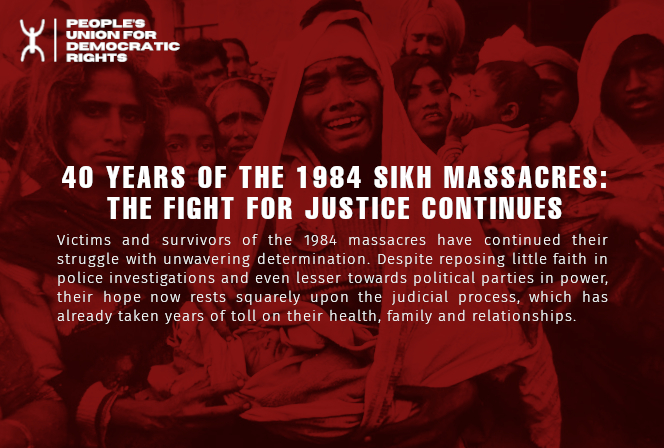The civil rights movement in India has emerged as an autonomous voice in defense of civil liberties and democratic rights of our people. The Peoples Union for Democratic Rights, Delhi, is one such organisation. It came into existence in 1977 as the Delhi unit of a larger national forum, PUCLDR, and became PUDR on 1 February, 1981.

Sections
Latest Press Statements
PUDR Salutes Prof. Rajni Kothari
People’s Union for Democratic Rights expresses its sincere condolences on the death of Professor Rajni Kothari, public intellectual, civil rights activist and institution builder. A leading intellectual, Prof. Rajni Kothari’s academic pursuits emerged from his...
दो दशक पुराने कुनन पश्पोरा मामले में पुनः जांच स्थगित – सैन्य बलों को प्राप्त दण्डमुक्ति का एक और उदाहरण
पी.यू.डी.आर. एक बार फिर इस देश में सैन्य बलों को मिली कानूनी दण्डमुक्ति के मुद्दे को चिन्हित करना चाहता है | 16 जनवरी 2015 को कुनन पश्पोरा बलात्कार मामले में जम्मू कश्मीर उच्च न्यायलय ने एक ऐसा निर्देश जारी किया जो इस बात की तरफ इशारा करता है की इस देश में सैन्य बलों...
Why was Greenpeace activist prevented from travelling to London?
PUDR condemns the Union Government for preventing Ms. Priya Pillai of Greenpeace (India) from travelling to London. Greenpeace came under scrutiny because of its support to Mahan Sangharsh Samiti, a grassroots organisation challenging coal mining license for Mahan...
Condemning Undemocratic Extension of AFSPA
PUDR strongly condemns the extension of the Armed Forces Special Powers Act, 1958 (AFSPA) in Assam, on January 2, 2015 under Section 3 of the Act by the Government of India. Coming in the wake of the recent massacre of adivasis by the National Democratic Front of...
Can Compensation replace Justice?
On 18th December 2014, the Supreme Court directed the Central Government to pay Rs. 10 lakh as compensation to the family of Thangjam Chanu Manorama Devi. PUDR recognizes that this is a small step but cannot be a substitute for actual justice. Reacting to the SC...
Latest Publications
Walled City Riots: A Report On The Police And Communal Violence In Delhi 19-24 May, 1987
The end of every riot is the start of preparation for the next one—not only by stocking up knives, lathis and guns— but by silent acceptance of what is fast becoming part of routine life in our cities and towns. People have learnt to live with riots. Yet, all through,...
न्याय की नौटंकी`- १९८४ दंगे-मिश्रा कमीशन की आलोचना
नवंबर १९८४ में हुए दंगों पर आयुक्त मिश्रा कमीशन की रिपोर्ट एक आलोचना Click below for full report nayay-ki-nautangki-1984-riots-mishra commission.pdf
Justice Denied: Critique of the Mishra Commission Report on the Riots in November 1984
Delhi along with many other places, in the country, witnessed widespread disturbances in which thousands of Sikhs were killed from 31 October to 7th November, following the assassination of Prime Minister India Gandhi. Within a week after the carnage, on 17th...
Bastar: An investigation into an encounter
In Bastar, as in other parts of the country, slowly the forest dwellers are getting awakened and organised. They are raising their voice against the increasing encroachments on their lands and rights by the forest department, against the harassment by forest officials...
Who Are The Guilty?
Report of a joint inquiry into the causes and impact of the riots in Delhi from 31 October to 10 November 1984. The report is primarily based on case studies -carried out in the trans-jamuna and West Delhi areas. It is by no means exhaustive and covers only partially...
Latest Prison projects
No Results Found
The page you requested could not be found. Try refining your search, or use the navigation above to locate the post.
